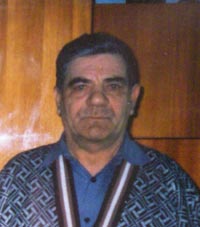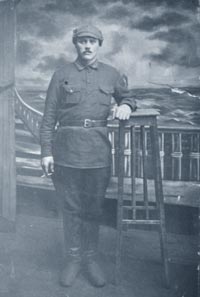









 Born in the Odessa Region, hamlet of Neuburg (Novogradovka) in 1934.
Born in the Odessa Region, hamlet of Neuburg (Novogradovka) in 1934.
The family lived under occupation for a period of three years. When the German troops began to draw back, the family was forced to go with them to Germany. By horse-dran vehicles they first headed for the town of Brest; from there they continued the trip by train.
Immediately after their arrival in Poland they happened to get into the Soviet zone. The Soviet government promised the Ukraine-Germans that they would take them back home; however, instead of repatriating them, they took them directly to the Krasnoyarsk Territory. They received some paper specifiying all the property they had to leave behind, but never received any compensation for their losses. In 1949 they managed to buy themselves a cow from own financial means.
They were transported to Siberia on freight cars; the train stopped several times. En route they received a bread ration and some canned meat of American origin. During the trip they became victims of someone who had resorted to stealing: the mother had taken along a 15 kg bag of flour; someone took it away without being noticed.
 From Krasnoyarsk they went to Krutoy Log by steamship “Maiakovskiy”. The were to
disembark at 1 o’clock in the night and were immerdiately sent to Kargino.
From Krasnoyarsk they went to Krutoy Log by steamship “Maiakovskiy”. The were to
disembark at 1 o’clock in the night and were immerdiately sent to Kargino.
In Kargino they lived under adverse, miserable conditions, disposing of just one single quilted jacket for all family members. They washed their clothes by means of ashes and then swapped them for potatoes (a coat was valued 2 buckets filled with potatoes). They had lead a much better life in the Odessa Region, where they had owned a big, solid house; they had been working on their own farm, breeding cows and pigs. Apart from this they had a huge garden – there were grapevines, plum and apricot trees.
They worked on a kolkhoz farm. Instead of being paid a salary the management used to make check-lists on the number of daily work units they had succeeded to accomplish. They were assigned to work for the State Steamship Organization in Shirokiy Log, having to provide firewood for the steamers.
They were obliged to betake themselves to the commandant’s office once a month in order to get registered. The local residents behaved with respect and sympathy toward them.
In 1947 they suffered from terrible hunger.
Interviewed by Svetlana Chernousova and Yevdokia Kurushina
(AB – comments by Aleksei Babiy, Krasnoyarsk “Memorial”)
Fifth exhibition of history and human rights, Novokargino 2008